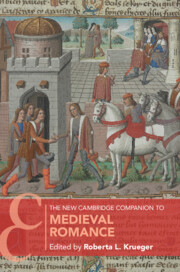Book contents
- The New Cambridge Companion to Medieval Romance
- The New Cambridge Companion to Medieval Romance
- Copyright page
- Contents
- Figures
- Contributors
- Acknowledgments
- Chronology
- Introduction
- 1 “For Love and For Lovers”
- 2 The Manuscript Contexts of Medieval Romance
- 3 Matters of Form
- 4 Authors, Narrators, and Their Stories in Old French Romance
- 5 Arthurian Transformations
- 6 Romance and the Medieval Mediterranean
- 7 The Crusading Romance in Britain
- 8 “Making Race” in Medieval Romance
- 9 The Construction and Interrogation of Gender in Old French Romance
- 10 Emotions as the Language of Romance
- 11 Medieval Iberian Romance
- 12 Medieval and Early Modern Italian Romance
- 13 German Medieval Romance
- 14 The Ends of Romance in Chaucer and Malory
- 15 French Romance in the Late Middle Ages and the Renaissance
- 16 Romance in Historical Context
- 17 Romance in Twentieth- and Twenty-First-Century Popular Culture
- Bibliography of Editions and Translations
- Index
- Cambridge Companions To …
- References
13 - German Medieval Romance
Published online by Cambridge University Press: 11 May 2023
- The New Cambridge Companion to Medieval Romance
- The New Cambridge Companion to Medieval Romance
- Copyright page
- Contents
- Figures
- Contributors
- Acknowledgments
- Chronology
- Introduction
- 1 “For Love and For Lovers”
- 2 The Manuscript Contexts of Medieval Romance
- 3 Matters of Form
- 4 Authors, Narrators, and Their Stories in Old French Romance
- 5 Arthurian Transformations
- 6 Romance and the Medieval Mediterranean
- 7 The Crusading Romance in Britain
- 8 “Making Race” in Medieval Romance
- 9 The Construction and Interrogation of Gender in Old French Romance
- 10 Emotions as the Language of Romance
- 11 Medieval Iberian Romance
- 12 Medieval and Early Modern Italian Romance
- 13 German Medieval Romance
- 14 The Ends of Romance in Chaucer and Malory
- 15 French Romance in the Late Middle Ages and the Renaissance
- 16 Romance in Historical Context
- 17 Romance in Twentieth- and Twenty-First-Century Popular Culture
- Bibliography of Editions and Translations
- Index
- Cambridge Companions To …
- References
Summary
The late twelfth century witnessed the emergence of the Middle High German courtly romance, first introduced by Hartmann von Aue, who translated primarily Erec and Iwein from his French sources by Chrétien de Troyes. Other poets soon followed suit, especially Wolfram von Eschenbach, Gottfried von Strassburg, and The Stricker. These romances competed with the traditional bridal-quest verse narratives, and also with contemporary heroic epics, but soon established themselves independently. The thirteenth century witnessed a considerable expansion of the genre, though many romances either turned into more sentimental narratives or imitated much of the ‘classical’ poets from around 1200. In the late Middle Ages, the verse romance was substituted by prose novels, often simply technical adaptations of the traditional courtly narratives (then also printed). However, in the fifteenth century some of those early novels were predicated on innovative themes and reflected the changes of time.
Keywords
- Type
- Chapter
- Information
- The New Cambridge Companion to Medieval Romance , pp. 194 - 210Publisher: Cambridge University PressPrint publication year: 2023

